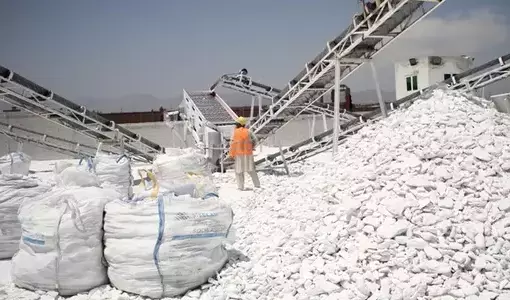Despite the immense security threats and uncertainties in Afghanistan, China has been exploring the trillion-dollar worth of Lithium minerals and experts from Chinese companies are busy conducting onsite inspections. According to the Chinese state affiliated newspaper Global Times several Chinese businessmen are marking a “concrete initial step” in potential cooperation in developing one of Afghanistan's biggest mineral deposits.
GT Exclusive: Chinese firms explore lithium projects in Afghanistan, but risks remain
“They have arrived in Chinatown and are conducting inspections in Afghanistan as planned,” Yu Minghui, director of the China Arab Economic and Trade Promotion Committee in Kabul and Afghanistan's mining ministry told Global Times adding that though these representatives were most concerned about basic guarantees of security and social order in Afghanistan but they have praised the Taliban's friendliness toward Chinese investors. "Some believe friendly relations between China and Afghanistan are conducive to Chinese companies' operations," Yu said.
Afghanistan is rich in resources ranging from copper, lead, zinc, gold, oil and gas, bauxite, coal, iron ore and rare earths. It also has large reserves of lithium, a key component used for the batteries of electric vehicles. China is eying the opportunities in infrastructure and industry building and access to $1 trillion in these untapped mineral deposits.
Lithium is a very vital metal that is used in the manufacturing of rechargeable batteries for almost all electronic machines including electric cars, and the Taliban has plenty of lithium deposits that sit in dried-up lake beds in the western province of Herat and Nimroz and the central-east Province of Ghazni. The world demand for lithium is expected to grow by over 40 times by 2040, according to the International Energy Agency. China already controls the majority of the supply of lithium deposits and is the largest manufacturer of electronics.
Also Read: China ready to deepen ties with Taliban as part of great game against West
In 2007, Chinese state-owned company took a $2.9 billion contract on a 30-year lease for Afghanistan's Mes Aynak copper mine but the project could not take off due to lack of security.
With plenty of reserves untapped, enough to satisfy the current demand for lithium, Afghanistan lacks the infrastructure for mining. Immediately after the Taliban seized power, China was quick to acknowledge the Taliban and was very keen to do business with them.
The Taliban is also effusive in its praise of Beijing, terming China as Afghanistan “most important partner” in national reconstruction efforts. While both parties have a vested interest in letting this view dominate their public communication, the fact remains that the Taliban has not been unable to provide security since they have formed their regime.
While Beijing is not in a hurry to formally recognize the Taliban government, it has made clear to the Taliban that it is ready to do business with them if the group makes a clean break from other militant organisations like al-Qaeda and The East Turkmenistan Islamic Movement (ETIM).
Also Read : China gets tough with Taliban–demands curbs on Uyghur radicals nesting in Afghanistan
There are reports that many terror groups including many Taliban splinters have joined the Islamic State Khorasan Province (ISIS-K) which has called for “jihad” against the Chinese government “to free Muslims from the tyranny of the Chinese government by rising up against the fascist regime.”
China does want to reap economic benefits of a stable Afghanistan but it has to first ensure its security concerns. Past experience validates China’s concerns. Experts believe that irrespective of opportunities such as economic advantages for the BRI and cementing Chinese regional dominance, it is China’s defensive interest that remains at the core of its Afghan strategy.
Also Read : Taliban splinters–many from group join hard-line ISIS-K to support anti-China Uyghur fighters




















